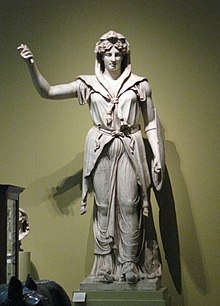Sacred geese of Juno
| Juno | |
|---|---|
| Goddess of marriage and childbirth | |
| Member of the Capitoline Triad | |

Juno Sospita, a plaster cast based on an original in the Vatican Museums
|
|
| Other names | Regina ("Queen") |
| Personal Information | |
| Consort | Jupiter |
| Children | Mars, Vulcan, Bellona, Juventas |
| Parents | Saturn |
| Siblings | Jupiter, Neptune, Pluto, Vesta, Ceres |
| Greek equivalent | Hera |
| Etruscan equivalent | Uni |
Juno (Latin: Iūnō [ˈjuːnoː]) is an ancient Roman goddess, the protector and special counselor of the state. She is a daughter of Saturn and sister (but also the wife) of the chief god Jupiter and the mother of Mars and Vulcan. Juno also looked after the women of Rome. Her Greek equivalent was Hera. Her Etruscan counterpart was Uni. As the patron goddess of Rome and the Roman Empire, Juno was called Regina ("Queen") and, together with Jupiter and Minerva, was worshipped as a triad on the Capitol (Juno Capitolina) in Rome.
Juno's own warlike aspect among the Romans is apparent in her attire. She often appeared sitting pictured with a peacock, amed and wearing a goatskin cloak. The traditional depiction of this warlike aspect was assimilated from the Greek goddess Athena, whose goatskin was called the 'aegis'.
The name Juno was also once thought to be connected to Iove (Jove), originally as Diuno and Diove from *Diovona. At the beginning of the 20th century, a derivation was proposed from iuven- (as in Latin iuvenis, "youth"), through a syncopated form iūn- (as in iūnix, "heifer", and iūnior, "younger"). This etymology became widely accepted after it was endorsed by Georg Wissowa.
Iuuen- is related to Latin aevum and Greek aion (αιών) through a common Indo-European root referring to a concept of vital energy or "fertile time". The iuvenis is he who has the fullness of vital force. In some inscriptions Jupiter himself is called Iuuntus, and one of the epithets of Jupiter is Ioviste, a superlative form of iuuen- meaning "the youngest".Iuventas, "Youth", was one of two deities who "refused" to leave the Capitol when the building of the new Temple of Capitoline Jove required the exauguration of deities who already occupied the site. Juno is the equivalent to Hera, the Greek goddess for love and marriage. Juno is the Roman goddess of love and marriage. Ancient etymologies associated Juno's name with iuvare, "to aid, benefit", and iuvenescendo, "rejuvenate", sometimes connecting it to the renewal of the new and waxing moon, perhaps implying the idea of a moon goddess.
...
Wikipedia
